
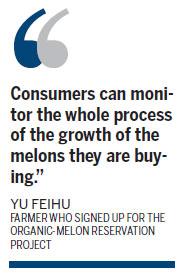
Experts warn the popular fruit may not be completely risk-free
Some Shanghai locals have been so worried about food safety that they are ordering organic watermelons, while some experts warn that the food is not necessarily risk-free.
Shanghai Nonghao Farmers' Market, one of the most popular organic-food markets in Shanghai, said on its micro blog on Feb 27 that the open-air-grown melons, free of pesticides and chemical fertilizers, can be ordered in advance for 10 yuan ($1.60) a kg, almost twice the price of ordinary melons sold in the city every summer. Customers must book at least 50 kg per order.
This is the first time the market has made farm produce available for pre-order.
Cai Xia, a volunteer at the nonprofit market, said the response has been good since the post appeared.
"More than 30 orders have been placed, and dozens more are being discussed," Cai said a week after the post appeared online, in a phone interview with China Daily.
A mother of a teen boy, the 40-year-old Shanghai accountant said she has spent about 4,000 yuan on organic vegetables from the market since last spring. The cost is "pricey" but "worth it for the family's health".
Cai became a volunteer in the market because she wants to do something so that "the big environment" (of organic farming) can be improved and "ideally the government will step in to help".
Farmers who are long-term suppliers of the market will plant melon seeds according to the number of bookings they receive. Planting will start early in March, and the fruit will be harvested in July.
Yu Feihu, one of the farmers who signed up for the organic-melon reservation project, told China Daily that when he returned to his hometown in Chongming county in Shanghai to become a farmer two years ago, he discovered that most of the melons there were grown with lots of pesticides in greenhouses to ensure a high yield.
But when he and other urban farmers decided to "return to the natural way", problems like what to plant and how much overwhelmed the townspeople, who know very little about the land.
"It's a win-win situation. For farmers, the risk of 'selling hens on a rainy day' can be reduced," he said, using a metaphor to explain the lower chance of growers needing to unload produce at an unfavorable time and price.
"Consumers can monitor the whole process of the growth of the melons they are buying," said Yu, who described himself as a former "real estate industry worker".
However, organic food is also flawed, at least according to some soil experts.
"Using chemical fertilizer doesn't necessarily mean food poisoning, while using organic fertilizer doesn't guarantee 100 percent food safety," Zhou Jianmin, president of the Nanjing Branch of Chinese Academy of Sciences and a researcher on soil, told Yangtze Evening News earlier this month.
"Chemical fertilizer per se is not harmful if used in appropriate quantities. And organic fertilizer, especially animal feces, is likely to contain pathogenic bacteria, heavy metal and other pollutants," Zhou said.
Other industry insiders argue that organic food may not be "more dangerous" than their conventional alternatives, but the low output per unit compared with conventional food is unlikely to be enough to feed the whole country.
A 1,300-square-meter field from three farms, including Yu's in Chongming, has been set aside for the project. The market promises no chemical or artificial flavoring will be used on the melons, and money will be refunded if underproduction occurs.
But the sweet taste of the melons cannot be promised, as the post warned. "We are growing it in a natural way, and we have to accept its natural taste," Yu said.
xujunqian@chinadaily.com.cn
(China Daily 03/20/2013 page7)

2013 Chinese New Year |

Hidden dragons, crouching tigers |
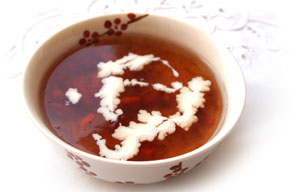
Soap beans, silver ears and peach gum |

Special:Winter Solstice |

Mario themed restaurant opens in Tianjin |
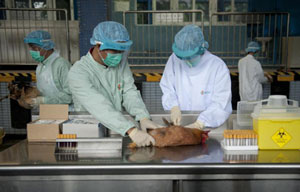
HK carries out avian influenza tests on imported chicken |
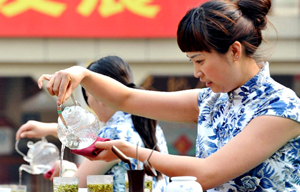
2013 China Tea Conference kicks off in Zhejiang |
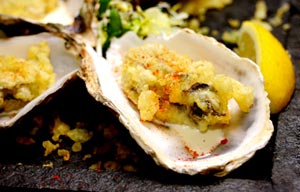
Oysters make spring sing for diners in Beijing |